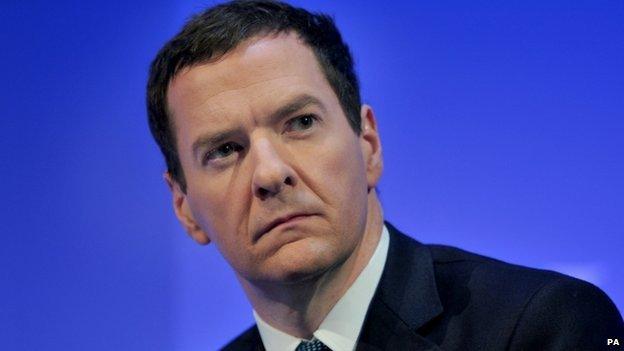Autumn Statement: Osborne's political balancing act
- Published

George Osborne is trying to change the subject. For months now the national conversation has been dominated by everything the Conservatives would rather avoid: defections and by-elections, Europe and UKIP, crises in A&E, immigration and yet more immigration.
These are all issues that either favour the Conservatives' opponents or stop them talking about their chosen agenda, namely the economy.
So to clear the decks, the prime minister announced his plans for immigration on Friday. The aim here was to close down the issue and give the Tory faithful something to say to UKIP.
And then on Sunday the chancellor announced his plans for more NHS spending. The aim here was to neutralise Labour's traditional comparative advantage on health. (The chancellor tried to link the economy with health, saying that only a strong economy could provide the funds needed by the NHS. For some reason, he chose not to say that it is also a strong economy that attracts so many immigrants from abroad.)
The purpose of all this, Downing Street insiders say, is "to clear the boulders out of the way" so the path is clear for the chancellor to talk about the economy and his plan, long-term or not.
Collective decisions
That is the power that a chancellor has in what Treasury officials call a "fiscal event" such as an Autumn Statement - that he can use to set a political agenda.
And it is no longer just one day; it is an entire week of announcements that allow the government of the day to dominate the political agenda and crowd out anything an opposition party may wish to say.
Hence the long list of dual carriageway improvements the government has announced to roads up and down England, some of them curiously close to marginal constituencies.
A tunnel passing Stonehenge is among dozens of new road schemes to be announced as part of a £15bn "roads revolution" for England
The Lib Dems are doing everything they can to claim credit for some of the announcements - ensuring that Nick Clegg visits Stonehenge as well as the prime minister, ensuring that Chief Secretary to the Treasury Danny Alexander is on the TV talking about infrastructure.
Their aim is to try to show voters that this Autumn Statement is as Lib Dem as it is Tory, a document written jointly about collective coalition decisions. Their frustration at Mr Osborne stealing all the headlines is palpable.
'Pay-less recovery'
The problem for Mr Osborne and Mr Alexander is that while they compete to announce the good news, they may be less willing to claim responsibility for the bad.
The official figures from the Office for Budget Responsibility are expected to show that while the economy is growing and jobs are being created, the deficit is not falling as fast as expected. Officials say there has been less revenue than expected from oil sales, stamp duty and income tax.
In their counter-attack, Labour will say this shows that the government has presided over the wrong kind of recovery, one that creates too many low-paid jobs that do not generate the tax revenues - or reduce the welfare bills - needed to fix the deficit.
Ed Miliband calls it the "joyless, pay-less recovery". Their aim is to link the poor public finances with their favoured issue, namely the cost of living; their argument will be that if you fix the economy properly, with better jobs that pay more, then you will do a better repair job on the public finances.
Expectation v reality
George Osborne's challenge is simple to explain but hard to achieve. He will want to use the poor borrowing figures to try to convince voters that the recovery is still too fragile to risk any change of government. But he will want to avoid voters concluding that his failure to fix the deficit at the pace he intended means that it might be time to give Labour a go. It is quite a balancing act.
What no party will spell out in full is quite what this might mean for spending cuts down the line.
If the deficit remains stubbornly high, then that means bigger cuts for unprotected departments in the future. It also means it would be harder for Mr Osborne to find money for the £7bn in tax cuts he promised at his party conference.
The political risk is this: whoever wins the next election is going to have to cut a lot more public spending.
No party has yet been completely candid about where and when the axe will fall. And yet opinion polls suggest that many voters already believe that the era of austerity is coming to an end.
At some point that public expectation will clash with fiscal reality. But there is little sign that any party wants that to come before we go to the polls next May.
- Published10 October 2014
- Published19 September 2014